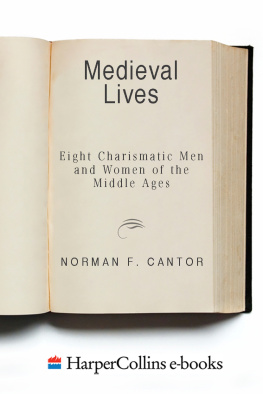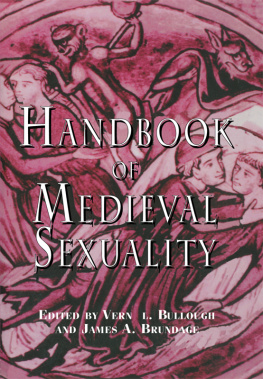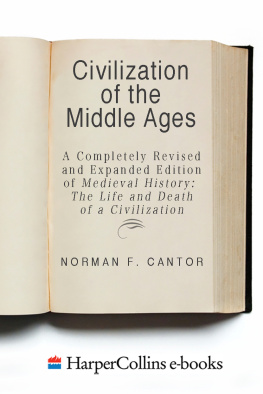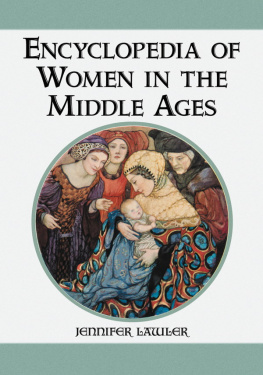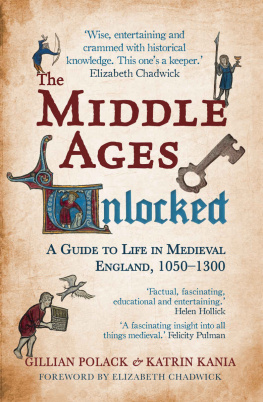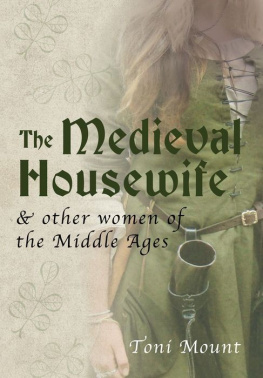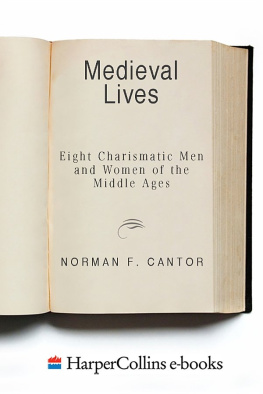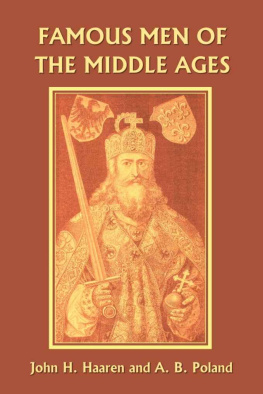
GENDER IN HISTORY
Series editors:
Lynn Abrams, Cordelia Beattie, Pam Sharpe and Penny Summerfield
The expansion of research into the history of women and gender since the 1970s has changed the face of history. Using the insights of feminist theory and of historians of women, gender historians have explored the configuration in the past of gender identities and relations between the sexes. They have also investigated the history of sexuality and family relations, and analysed ideas and ideals of masculinity and femininity. Yet gender history has not abandoned the original, inspirational project of womens history: to recover and reveal the lived experience of women in the past and the present.
The series Gender in History provides a forum for these developments. Its historical coverage extends from the medieval to the modern periods, and its geographical scope encompasses not only Europe and North America but all corners of the globe. The series aims to investigate the social and cultural constructions of gender in historical sources, as well as the gendering of historical discourse itself. It embraces both detailed case studies of specific regions or periods, and broader treatments of major themes. Gender in History titles are designed to meet the needs of both scholars and students working in this dynamic area of historical research.
Gender, nation and conquest in the high Middle Ages
ALSO AVAILABLE IN THE SERIES
Myth and materiality in a womans world: Shetland 18002000
Lynn Abrams
Destined for a life of service: defining African-Jamaican womanhood, 18651938
Henrice Altink
Gender and housing in Soviet Russia: private life in a public space
Lynne Attwood
Love, intimacy and power: marital relationships in Scotland, 16501850
Katie Barclay
History, patriarchy and the challenge of feminism (with University of Pennsylvania Press)
Judith Bennett
Modern women on trial: sexual transgression in the age of the flapper
Lucy Bland
Gender and medical knowledge in early modern history
Susan Broomhall
The truest form of patriotism: pacifist feminism in Britain, 18701902
Heloise Brown
Artisans of the body in early modern Italy: identities, families and masculinities
Sandra Cavallo
Women of the right spirit: paid organisers of the Womens Social and Political Union (WSPU) 190418
Krista Cowman
Modern motherhood: women and family in England, c. 19452000
Angela Davis
Masculinities in politics and war: gendering modern history
Stefan Dudink, Karen Hagemann and John Tosh (eds)
Victorians and the Virgin Mary: religion and gender in England 18301885
Carol Engelhardt Herringer
Living in sin: cohabiting as husband and wife in nineteenth-century England
Ginger S. Frost
Jewish women in Europe in the Middle Ages: a quiet revolution
Simha Goldin
Murder and morality in Victorian Britain: the story of Madeleine Smith
Eleanor Gordon and Gwyneth Nair
The military leadership of Matilda of Canossa, 10461115
David J. Hay
The shadow of marriage: singleness in England, 191460
Katherine Holden
Women police: gender, welfare and surveillance in the twentieth century
Louise Jackson
Noblewomen, aristocracy and power in the twelfth-century Anglo-Norman realm
Susan Johns
The business of everyday life: gender, practice and social politics in England, c.16001900
Beverly Lemire
Women and the shaping of British Methodism: persistent preachers, 18071907
Jennifer Lloyd
The independent man: citizenship and gender politics in Georgian England
Matthew McCormack
Women, travel and identity: journeys by rail and sea, 18701940
Emma Robinson-Tomsett
Imagining Caribbean womanhood: race, nation and beauty contests, 192970
Rochelle Rowe
Infidel feminism: secularism, religion and womens emancipation, England 18301914
Laura Schwartz
The feminine public sphere: middle-class women and civic life in Scotland, c. 18701914
Megan Smitley
Being boys: working-class masculinities and leisure
Melanie Tebbutt
Elizabeth Wolstenholme Elmy and the Victorian feminist movement: the biography of an insurgent woman
Maureen Wright
GENDER, NATION AND CONQUEST IN THE HIGH MIDDLE AGES
NEST OF DEHEUBARTH
Susan M. Johns
Manchester University Press
Manchester and New York
distributed in the United States exclusively by Palgrave Macmillan
Copyright Susan M. Johns 2013
The right of Susan M. Johns to be identified as the author of this work has been asserted by her in accordance with the Copyright, Designs and Patents Act 1988.
Published by Manchester University Press
Oxford Road, Manchester M13 9NR, UK
and Room 400, 175 Fifth Avenue, New York, NY 10010, USA
www.manchesteruniversitypress.co.uk
Distributed in the United States exclusively by Palgrave Macmillan
175 Fifth Avenue, New York, NY 10010, USA
Distributed in Canada exclusively by UBC Press
University of British Columbia, 2029 West Mall,
Vancouver, BC, Canada v6t 1z2
British Library Cataloguing-in-Publication Data
A catalogue record for this book is available from the British Library
Library of Congress Cataloging-in-Publication Data applied for
ISBN 978 0 7190 8999 2 hardback
First published 2013
The publisher has no responsibility for the persistence or accuracy of URLs for any external or third-party internet websites referred to in this book, and does not guarantee that any content on such websites is, or will remain, accurate or appropriate.
Typeset in Minion with Scala Sans display
by Graphicraft Limited, Hong Kong
For my family
This book has its origins in my work on Anglo-Norman women when I became intrigued by the lack of scholarly research on medieval Welsh women, particularly at a stage when my daughter was obsessed with princesses. Time has moved on, and whilst both of the former contentions are no longer true, Princess Nest of Deheubarth has remained for me a tempting figure, both because what we know of her is coloured by a dramatic and symbolic episode and because of what she represents about the rhythms and currents of medieval history and historiography. On a family visit to west Wales which included visits to Pembroke, Manorbier, Carew and Cilgerran castles, all of them distinct, dramatic ruins, I was even more convinced that the narrative of Nests past, as represented in the popular literature of those castles, was a subject which would have much to tell historians about the place and meaning of gender in the medieval past. The focus is not therefore limited to medieval Wales, but is inspired by scholarship and study of the medieval past more generally. I had become intrigued by these ideas whilst writing on Anglo-Norman women, and was able, whilst having a career-break looking after my young children, to think about these themes and ideas more broadly. I stepped back into academic life as a part-time tutor at Sheffield University where I had the good fortune to work with Ed King and Daniel Power, whose friendly interest in the project helped to sustain it through those early years of blending teaching, writing and childcare.


